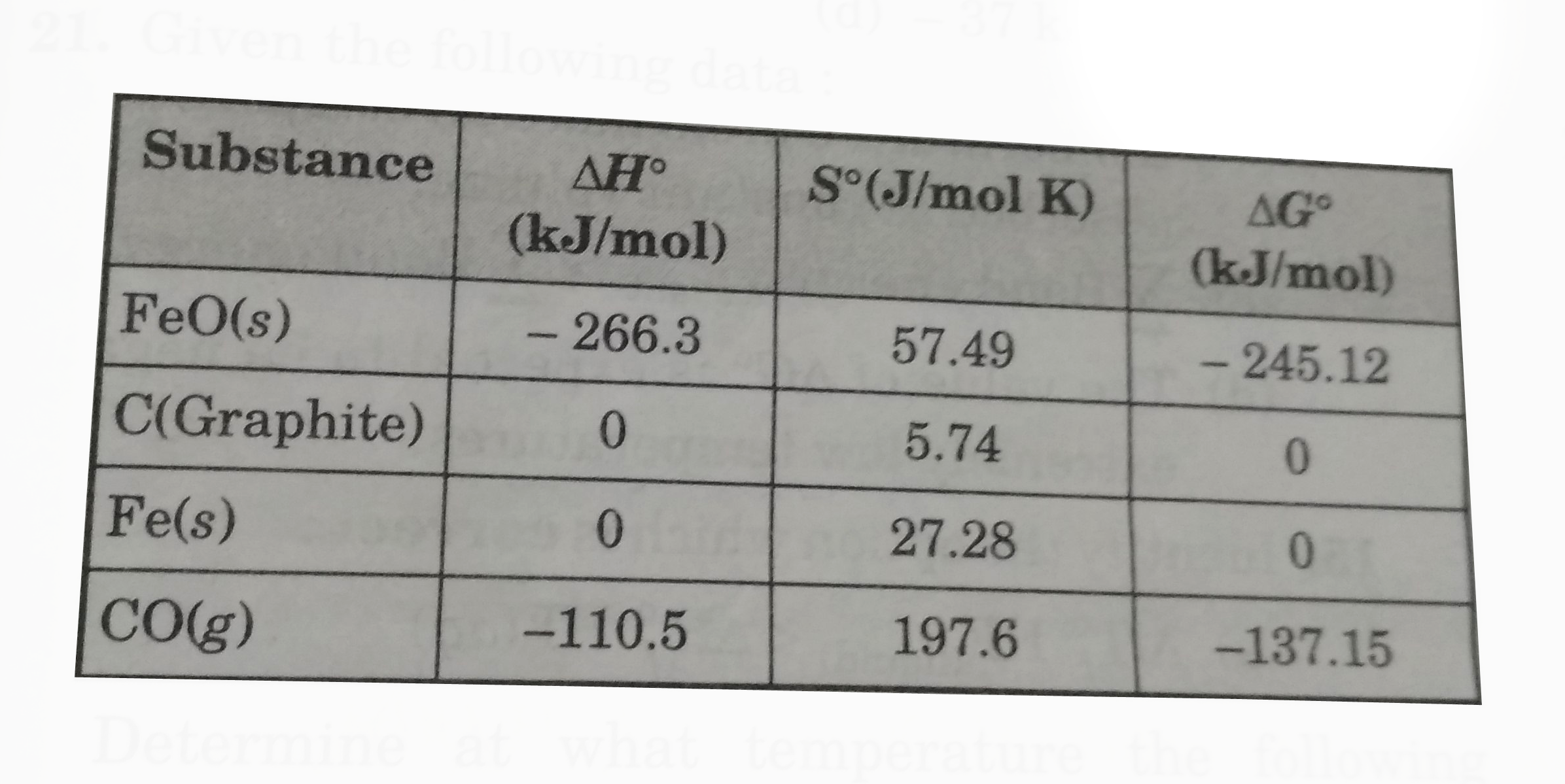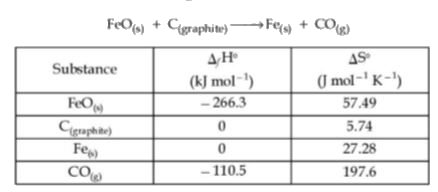Given the following data:
SubstanceΔH∘(KJ//mol)S∘(J//mol K)ΔG∘(KJ//mol)FeO(s)−266.357.49−245.12C(Graphite)05.740Fe(s)027.280CO(g)−110.5197.6−137.15
Determine at what temperature the following reaction is spontaneous?
FeO(S)+C(Graphite)→Fe(s)+CO(g)
298 k
668 K
964 K
ΔG∘ is +ve , hence the reaction will never be spontaneous
The correct Answer is:C
ΔG=ΔH−TΔS
ΔH=∑ΔHp−∑ΔHR
ΔH=−110.5+266.3=155.8 KJ
ΔS=∑Sp−∑SR
ΔS=197.6+27.28−(57.5+5.74)=161.64J/moleK
For reaction to be spontaneous, ΔG<0
ΔH−TΔS<0 ⇒ T>ΔHΔS=155800161.64=964 K
Topper's Solved these Questions
- BOOK - RESONANCECHAPTER - THERMODYNAMICSEXERCISE - exercise-2 Part:(II): Single and Double value integer type13videos
THERMODYNAMICS
- BOOK - RESONANCECHAPTER - THERMODYNAMICSEXERCISE - exercise-2 Part:(III): One or more than one options correct10videos
THERMODYNAMICS
- BOOK - RESONANCECHAPTER - THERMODYNAMICSEXERCISE - exercise-3 Part:(III) : Match the column3videos
THERMODYNAMICS
- BOOK - RESONANCECHAPTER - TEST SERIESEXERCISE - CHEMISTRY50videos
TEST SERIES
Similar Questions
At 1250K
2FeO(s)→2Fe(s)+O2(g), ΔG=+320kJmol−1 of O2
2C(s)+O2(g)→2CO(g), ΔG=−430kJmol−1 of O2
The following coupled reaction is spontaneous because
2FeO(s)+2C(s)→2Fe(s)+2CO(g)View SolutionDetermine ΔS total and show whether the following reaction is spontaneous is 25∘C
Fe2O3(s)+3CO(g)→2Fe(s)+3CO2(g)
ΔH∘=−24.8kJ,ΔS−1=15JK−1View Solution
Knowledge Check
- Question 1 - Select One
Given the following data
SubstanceΔH∘(KJ/mol)S∘(J/molK)ΔG∘(kJ/mol)FeO(s)−266.357.49−245.12C(Graphite)05.740Fe(s)05.740CO(g)−110.5197.6−137.15
Determine at what temperature the following reaction is spontaneous?
FeO(s)+C(Graphite)→Fe(s)+CO(g)A298KB668KC966KDΔG∘ is +ve hence the reaction will never be spontaneous - Question 2 - Select One
Given the following data :

Determine at what temperature the following reaction is spontanous?
FeO(s)+Cgraphite→Fe(s)+CO(g)A298 KB668 KC964 KDΔG∘ is +ve, hence the reaction will never be spontaneous - Question 3 - Select One
At what temperature the following process would not be spontanous ?
4Fe(s)+3O2(g)→2Fe2O3(s)
ΔH=−1648kJ/mole
ΔS=−560J/moleA2000 KB3000 KC2900 KD2500 K
From the following data at 25∘C, Calculate the standard enthalpy of formation of FeO(s) and of Fe2O3(s).
ReactionΔrH∘ (kJ/mole)(1)Fe2O3(s)+3C(graphite)→2Fe(s)+3CO(g)492.6(2)FeO(s)+C(graphite)→Fe(s)+CO(g)155.8(3)C(graphite)+O2(g)→CO2(g)−393.51(4)CO(g)+1/2O2(g)→CO2(g)−282.98View SolutionData given for the following reaction is as follows:
FeO(s)+C(graphite)→Fe(s)+CO(g)

The minimum temperature in K at which the reaction becomes spontaneous is ______ .
(Integer answer)View SolutionFor the reaction at 298K, 2A+B→C,ΔH=400kJmol−1,ΔS=0.2kJK−1mol−1. At what temperature will the reaction become spontaneous considering ΔHandΔS to be constant over the temperature range.
View SolutionWhat is the normal boiling point of mercury?
Given : ΔH∘f(Hg,l)=0,S∘(Hg,l)=77.4J/K−mol
ΔH∘f(Hg,g)=60.8kJ/mol,S∘(Hg,g)=174.4J/K−molView SolutionFor the following reaction at 25∘C,ΔH∘=+115kJandΔS∘=+125J/K. Calculate ΔG∘ for the reaction at 25∘C
SBr4(g)→S(g)+2Br2(I)View Solution

